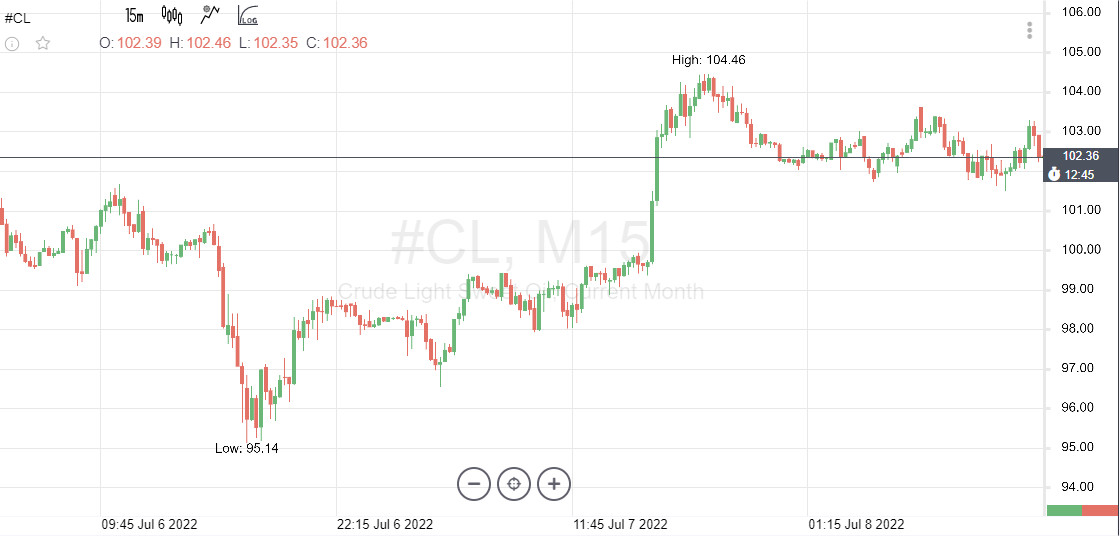
Oil quotes on Friday were trading either up or down. The cost of September Brent futures on the London ICE Futures exchange by 06:20 London time was $105.72 per barrel, that is, it was 1.02% higher than the closing price of the previous trading day. Later, the quotes went down and by 11:00 were already at $104.36 per barrel.
WTI oil futures for August on the electronic trading of the New York Mercantile Exchange in the morning hours were trading at $103.31 per barrel, and in the afternoon dropped to $102.36 per barrel. Earlier this week, the price of WTI fell by more than 20% from its last peak.
The growth of quotes in the morning hours was provoked by the news that the supply of Kazakh oil along the key export route may be suspended. So, the Novorossiysk court on Tuesday ordered the Caspian Pipeline Consortium to stop work for 30 days due to the identified environmental violations. The company is appealing the decision, and as of today has applied for a suspension of its execution.
However, according to RBC Capital Markets strategists Helima Croft and Michael Tran, the physical market is assessing the deficit, and the financial market is turning its attention to the approaching recession. It is possible that it has already begun, because the economic indicators of a number of the world's largest economies have completely ceased to inspire optimism.
For example, the largest EU economy, Germany, seriously intends to reduce the volume of manufactured products in the manufacturing industry due to the shortage of natural gas in the country. High energy prices, mainly in Europe and the United States, are forcing consumers to reduce consumption more and more.
I am glad that at least the activity in the tourism industry remains high. However, it is likely that after the end of the summer season, residents of developed economies will no longer be so willing to travel around the world because of too high prices.
The Citibank report published on Tuesday looks very pessimistic for the oil market. According to analysts of the largest international bank, by the end of this year, Brent and WTI quotes may collapse their positions and fall to $65 per barrel, which will be facilitated by the recession in the global economy. If by the end of this summer the economic decline still covers the whole world, and the demand for oil decreases more than predicted, then the bull market is likely to break. The recession and the subsequent reduction in fuel demand will provoke a strong and prolonged decline in prices.
In addition, there was information about the deterioration of the epidemiological situation in China. A new coronavirus-related lockdown is expected to be reintroduced in Shanghai. In addition to this, Japanese news outlets report that it is planned to tighten restrictions in Tokyo. And since China and Japan remain among the key importers of hydrocarbons, the risk of a slowdown in economic activity in these regions may negatively affect demand.
Data on fuel reserves in the United States published on Thursday showed that commercial oil reserves in the country increased by 8.23 million barrels last week, that is, at the fastest pace in the last eight weeks. At the same time, gasoline reserves decreased by 2.5 million barrels, and distillates – by 1.27 million. By the way, experts did not expect an increase in oil reserves in any way, but their decrease by 1.55 million barrels, as well as a decrease in gasoline reserves by 1.05 million and an increase in distillate reserves (by 1 million).
A significant increase in oil reserves last week can be explained by the fact that with an increase in the volume of imports, the volume of oil exports significantly decreased, and all this amid low utilization of refining capacities.

 English
English 
 Русский
Русский Bahasa Indonesia
Bahasa Indonesia Bahasa Malay
Bahasa Malay ไทย
ไทย Español
Español Deutsch
Deutsch Български
Български Français
Français Tiếng Việt
Tiếng Việt 中文
中文 বাংলা
বাংলা हिन्दी
हिन्दी Čeština
Čeština Українська
Українська Română
Română

